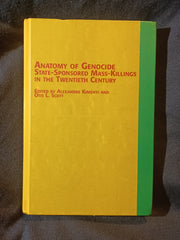Genetic Studies of Genius, Vol. 3, The Promise of Youth- Follow-up Studies of a Thousand Gifted Children edited by Barbara Stoddard Burks et. al. Inscribed
Genetic Studies of Genius, Vol. 3, The Promise of Youth- Follow-up Studies of a Thousand Gifted Children edited by Barbara Stoddard Burks, Dortha Williams Jensen, Lewis M.Terman, et. al. Stanford University Press. 1930. First printing -"Published, October, 1930" with no statement of later printings. 508 pages plus 14 pages publication preface and contents. On the first blank page is an inscription indicating Barbara Stoddard Burks gave the book to her parents, Francis and Jesse Burks, in 1930. Also laid in is a hand-written letter dated 1943 in ink of a colleague expressing the value of Barbara Stoddard Burks' work and sympathy regarding her premature death. On the letter is a notation in pencil, "typical of many letters I rec'd". Hardcover with no dust jacket. Modarate cover edge wear. Some abrasion to the back cover with a 25 cent piece sized brown stain there. Gilt lettering on the spine is considerably faded, but fairly bright on the front cover. Light shelf staining on the bottom of the page block. Light tanning to the pages with no comprimise to page flexibilty. 1/2" tear to the bottom joint of the half-title page. On pages 462 and 463 is a tan spot caused by a slier of paper used by a book mark. Otherwise, no previous owner markings. No unpublished folds or creases to pages. Binding is tight with no looseness to pages. Not ex-library, not remaindered and not a facsimile reprint. For sale by Jon Wobber, bookseller since 1978. DJ13a
"Barbara Stoddard Burks (December 22, 1902—May 25, 1943) was an American psychologist known for her research on the nature-nurture debate as it pertained to intelligence and other human traits. She has been credited with "...pioneer[ing] the statistical techniques which continue to ground the trenchant nature/nurture debates about intelligence in American psychology...Burks was born on December 22, 1902 in New York City, New York, to Jesse and Frances Burks... in 1935, she was given a fellowship by the General Education Board to study psychology in Europe,[4] where she collaborated with Jean Piaget, Carl Jung, and Charlotte Buhler....Burks is particularly known for her 1928 Ph.D. dissertation, which examined the relative effects of genetics and environment on the IQ scores of foster children in California.[7] This dissertation, completed at Stanford University, has been described as "a pioneering study in the field of behavioural genetics".[3] Her dissertation concluded that between 75 and 80% of variation in IQ scores was due to genetic factors.[4] The study was cited favorably by Arthur Jensen in support of his hereditarian views, but it has been criticized for having a biased sample and for its limited measurements of environmental factors....Burks died on May 25, 1943, when she "either fell or jumped to her death from the George Washington Bridge" in New York City, New York. Paul J. Nahin has suggested that Burks may have committed suicide because of depression, and that this may have been partly due to Vannevar Bush's decision to close the eugenics program at Cold Spring Harbor in 1940." - Wikipedia
"Barbara Stoddard Burks (December 22, 1902—May 25, 1943) was an American psychologist known for her research on the nature-nurture debate as it pertained to intelligence and other human traits. She has been credited with "...pioneer[ing] the statistical techniques which continue to ground the trenchant nature/nurture debates about intelligence in American psychology...Burks was born on December 22, 1902 in New York City, New York, to Jesse and Frances Burks... in 1935, she was given a fellowship by the General Education Board to study psychology in Europe,[4] where she collaborated with Jean Piaget, Carl Jung, and Charlotte Buhler....Burks is particularly known for her 1928 Ph.D. dissertation, which examined the relative effects of genetics and environment on the IQ scores of foster children in California.[7] This dissertation, completed at Stanford University, has been described as "a pioneering study in the field of behavioural genetics".[3] Her dissertation concluded that between 75 and 80% of variation in IQ scores was due to genetic factors.[4] The study was cited favorably by Arthur Jensen in support of his hereditarian views, but it has been criticized for having a biased sample and for its limited measurements of environmental factors....Burks died on May 25, 1943, when she "either fell or jumped to her death from the George Washington Bridge" in New York City, New York. Paul J. Nahin has suggested that Burks may have committed suicide because of depression, and that this may have been partly due to Vannevar Bush's decision to close the eugenics program at Cold Spring Harbor in 1940." - Wikipedia













